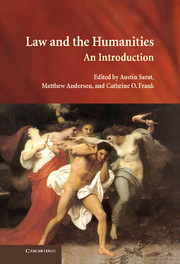Book contents
- Frontmatter
- Contents
- Contributors
- Acknowledgments
- Introduction: On the Origins and Prospects of the Humanistic Study of Law
- I PERSPECTIVES ON THE HISTORY AND SIGNIFICANCE OF SCHOLARSHIP IN LAW AND THE HUMANITIES: THREE VIEWS
- II IDEAS OF JUSTICE
- III IMAGINING THE LAW
- IV LINGUISTIC, LITERARY, AND CULTURAL PROCESSES IN LAW
- V INSTITUTIONAL PROCESSES
- 17 Trials
- 18 Testimony, Witnessing
- 19 Judgment in Law and the Humanities
- 20 Punishment
- Index
- References
18 - Testimony, Witnessing
Published online by Cambridge University Press: 20 January 2010
- Frontmatter
- Contents
- Contributors
- Acknowledgments
- Introduction: On the Origins and Prospects of the Humanistic Study of Law
- I PERSPECTIVES ON THE HISTORY AND SIGNIFICANCE OF SCHOLARSHIP IN LAW AND THE HUMANITIES: THREE VIEWS
- II IDEAS OF JUSTICE
- III IMAGINING THE LAW
- IV LINGUISTIC, LITERARY, AND CULTURAL PROCESSES IN LAW
- V INSTITUTIONAL PROCESSES
- 17 Trials
- 18 Testimony, Witnessing
- 19 Judgment in Law and the Humanities
- 20 Punishment
- Index
- References
Summary
“Testimony” is a richly multivalent term. It describes the statement of a witness in court, “offered as evidence of the truth of that which is stated;” but it is also a profession of religious faith, and a story habitually narrated in the first person by those who seek to bear witness to the role of traumatic events in the formation of larger historiographical narratives. This is the essential ambiguity of the term “testimony”: That it not only encompasses narratives of personal experience, which require no immediate external verification, but that it also seeks to be regarded as a species of evidence – that it is articulated in a public forum with a view to establishing its “truth.” Indeed, jurists acknowledge that there is a sense in which testimony is the sole medium of judicial evidence: Putative distinctions between testimony and circumstantial or documentary evidence founder upon the requirement that documents and things produced in court must nevertheless be described (and their provenance accounted for) by a witness.
The centrality of testimony to the trial process has ensured the emergence of cogent rules to test its validity, which often operate simultaneously to suppress its similarities to narrative fiction and story. Current Anglo-American law is concerned to establish the competence and compellability of a potential witness to the fact at issue: Competence relates to whether or not a party may be permitted to testify, and compellability refers to whether or not that party may be forced to do so by the service of witness summons and the provision of sanctions in the event that such a summons is ignored.
- Type
- Chapter
- Information
- Law and the HumanitiesAn Introduction, pp. 478 - 495Publisher: Cambridge University PressPrint publication year: 2009



